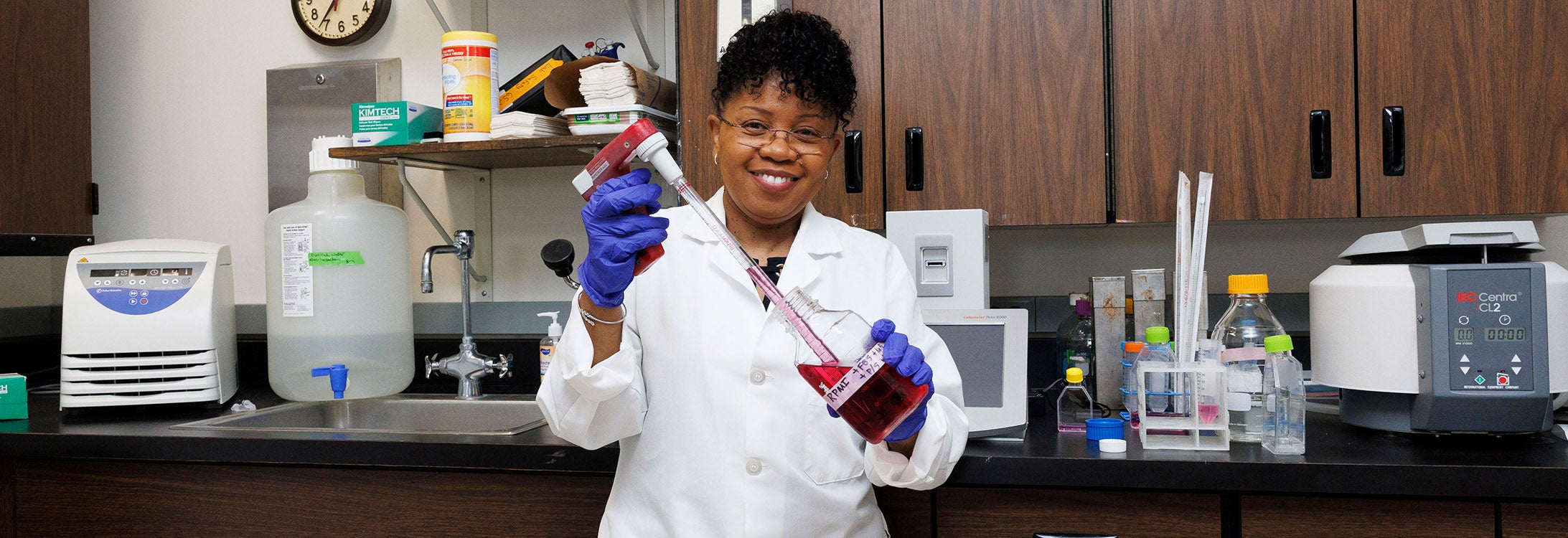ECU researcher approved for NCInnovation funding for promising melanoma treatment
NCInnovation
NCInnovation is a 501(c)(3) not-for-profit corporation focused on supporting North Carolina public university research that has commercial promise. NCInnovation deploys funding, mentors and support services so that university proofs-of-concept can advance toward commercialization, creating jobs that remain in North Carolina. Learn more at the NCInnovation website.
East Carolina University’s Dr. Rukiyah Van Dross-Anderson, associate professor in pharmacology and toxicology at the Brody School of Medicine, has been approved for grant funding from NCInnovation to continue her work in developing a groundbreaking cancer immunotherapy for melanoma patients.
Van Dross-Anderson is among the first researchers to be approved by the NCInnovation Board of Directors to receive funding for research that has commercial promise. Inaugural funding totaling $5.2 million will go to eight researchers at universities across the state. Van Dross-Anderson is expected to receive close to $900,000.
“Dr. Van Dross-Anderson’s work is a potential game changer for cancer treatment and is a perfect example of how NCInnovation can work with researchers to translate breakthroughs in the lab into products that can make a difference in the lives of our families and neighbors,” said ECU Chancellor Philip Rogers. “We appreciate the support of state lawmakers and NCInnovation for applied research at ECU, and we’re excited to see how this work will progress.”
Van Dross-Anderson is developing a first-of-its kind cancer immunotherapy for melanoma patients to eliminate the cancer cell and prompt the immune system to seek out and destroy other cancer cells. The immunotherapy is for melanoma patients who do not respond to current treatments. She hopes her work will increase survivability and reduce melanoma recurrence.
“I am grateful to NCInnovation for creating an avenue through which innovation and commercialization can be supported,” Van Dross-Anderson said. “This award will provide resources for me and my team to develop our cancer therapeutic in the state of North Carolina. As a result, we are now one step closer to helping cancer patients live longer and healthier lives.”
NCInnovation is a statewide nonprofit formed to help translate university research into economic output. Last year, the organization received $500 million in state funding as an endowment to accelerate the commercialization of research at public universities. NCInnovation is working to deploy the interest earned on the endowment to provide grant funding and wraparound support services to university researchers.
“East Carolina University’s researchers are working on incredible innovations,” said Michelle Bolas, NCInnovation executive vice president and chief innovation officer. “Partnering with Dr. Van Dross-Anderson on her breakthrough discovery in cancer immunotherapy aligns with our mission to support research that solves some of today’s most pressing challenges and ultimately improve lives.”
Dr. Sharon Paynter, acting chief research and engagement officer, said, “Without this funding, the likelihood of continuing the development of this breakthrough cancer therapeutic is considerably reduced. Helping inventors like Dr. Van Dross-Anderson move their innovations forward is a critical strategy for retaining and recruiting businesses to our state.”
Next steps for Van Dross-Anderson’s team include working with biotech companies that perform regulatory services required by the FDA — services she says are expensive. That’s where the grant from NCInnovation comes in to help with the process.
“To get a drug approved for use, you must first perform preclinical studies that provide proof that the agent is effective. There are also a series of regulatory studies that must be conducted to ensure that the agent is not toxic. Contract research organizations and development and manufacturing organizations have the expertise and facilities that meet FDA standards,” she said.
From there, Van Dross-Anderson said the team will work with the FDA to obtain approval to examine the efficacy of the treatment in patients. She expects the first clinical study to begin in 2026.
Van Dross-Anderson said it typically takes five to seven years to complete clinical studies and receive approval for commercial use.
